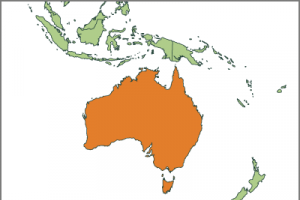The Trans-Pacific Partnership (TPP) is a highly secretive and expansive free trade agreement between the United States and twelve Pacific Rim countries, including Canada, Mexico, New Zealand and Australia. Leaked text reveals that the TPP would empower corporations to directly sue governments in private and non-transparent trade tribunals over laws and policies that corporations allege reduce their profits.
Legislation designed to address climate change, curb fossil fuel expansion and reduce air pollution could all be subject to attack by corporations as a result of TPP.
Australia
Other information
23 December 2013
Other information
30 May 2009
Australia like all colonial countries was founded upon the theft of indigenous peoples land. However in Australia, the authorities took the theft one step further by declaring the continent to be ‘Terra Nullius’, meaning an empty land or a land belonging to nobody. Terra Nullius guaranteed indigenous people no legal rights, for how could they have rights if legally they did not exist?
Other information
17 August 2008
WRM information sheets on GE tree research
First posted: 1st August 2008
Last update: August 2014
Tree species being manipulated:
eucalyptus
Aim of genetic manipulation
Other information
27 May 2008
On the first days of this month the Tasmanian people got to know of a deal that had been struck four months before between their government and the timber company Gunns. The deal, called the Sovereign Risk Agreement, provides that taxpayers should fund the company along 20 years with $15 million in case its wood supply is compromised by any reason. (1)
Bulletin articles
8 November 2007
A short while ago on the international tourist scale, Tasmania was voted the second most beautiful location to visit in the world. It has spectacular mountains and ancient forests, pristine beaches, an abundance of unique wildlife, a cool temperate climate and a low population.
Much of this has been declared World Heritage and there are walking and hiking trails that are breathtakingly beautiful. Despite its small size, it also has some of the best farmland in Australia enjoying a generally good rainfall, and is proud of its 'clean, green image'.
Bulletin articles
17 October 2007
In August 2007, ArborGen signed an agreement which brings the company's aim of being "the pre-eminent player in the global development and marketing of bio-engineered trees to the forestry industry" another dangerous step closer to reality.
Bulletin articles
17 September 2007
Indigenous Peoples have achieved a major victory at the United Nations level. After more than 20 years of negotiations, on September 13 the United Nations General Assembly finally adopted the United Nations Declaration on the Rights of Indigenous Peoples.
Bulletin articles
18 August 2007
This week, the Tasmanian Parliament will debate Gunns' proposed pulp mill at Bell Bay in Tasmania. If built, the US$1.4 billion project would need four million tonnes of logs a year. It would double Gunns current rate of clearcutting in Tasmania's native forests. The pulp mill would produce large amounts of toxins, polluting the air and Tasmania's Bass Strait.
The day before the Tasmanian Parliament started its discussions, Australia's Federal Environment Minister Malcolm Turnbull announced a "draft decision" to approve the pulp mill.
Other information
26 February 2007
Last year, about 170 farmers met in the farming community of South Riana to air their concerns and see how to stop valuable farmland being converted to timber plantations. They were concerned for the future of the area -- built on successful dairy and cropping enterprises -- and called for the Tasmanian Government to abolish tree plantation development on prime agricultural land.
Other information
30 October 2006
In our previous issue (WRM Bulletin Nº 110), we published a section on “plantation certification at its worse”, including the case of the Pan European Forest Certification Scheme (PEFC), a programme for the endorsement of national certification schemes.
Bulletin articles
2 July 2006
Currently the main plantation companies operating in Australia certified by FSC are: Albany Plantation Forest Company Pty Ltd (23,509 ha), Timbercorp Forestry Pty Ltd. (97,000 ha), Integrated Tree Cropping Limited (166,536 ha), Hancock Victorian Plantations Pty. Limited (246,117 ha).


